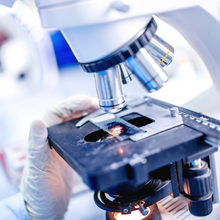Microbiology Society comments on the Prime Minister’s call for Artificial Intelligence to be used to transform outcomes for people with chronic diseases
21 May 2018

The Prime Minister will use a speech to challenge the NHS, Artificial Intelligence (AI) sector and charities to use data and AI to transform the diagnosis of chronic diseases as part of the government’s industrial strategy.
Urging the NHS and technology companies to use AI as a "new weapon" in research, Teresa May will say the plans envisage at least 50,000 people each year being diagnosed at an early stage of prostate, ovarian, lung or bowel cancer – people who would have otherwise been diagnosed at a later and more deadly stage.
This would be done through using emerging technologies to cross reference people’s genetics, habits and medical records with national data to spot those at an early stage of cancer – empowering doctors to make referrals to an oncologist earlier and potentially ahead of clear symptoms developing.
The Prime Minister will say: “Late diagnosis of otherwise treatable illnesses is one of the biggest causes of avoidable deaths. And the development of smart technologies to analyse great quantities of data quickly and with a higher degree of accuracy than is possible by human beings opens up a whole new field of medical research and gives us a new weapon in our armoury in the fight against disease. Achieving this mission will not only save thousands of lives. It will incubate a whole new industry around AI-in-healthcare, creating high-skilled science jobs across the country, drawing on existing centres of excellence in places like Edinburgh, Oxford and Leeds – and helping to grow new ones.”
Professor Neil Gow FRS, President of the Microbiology Society, said:
“It's very positive that the Prime Minister is keen to capitalise on the UK's great scientific strengths in this way. Patients may of course survive cancer treatments only to have all the advanced treatments they have received undone by aggressive infections caused by bacteria and fungi that take a hold when their immunity is weakened. Indeed, we also know that some viruses and bacteria can actively promote or induce cancer. Therefore, microbiologists will have to continue work side-by-side with oncologists and haematologists to develop treatments and diagnostics that will ensure that patients are not only treated for malignancy, but also protected from potentially fatal infections that are associated with cancer treatments. And research is on going as to the extent to which microbes are agents of cancer, which is another reason to ensure that scientists work in multidisciplinary teams to tackle big challenges.”


